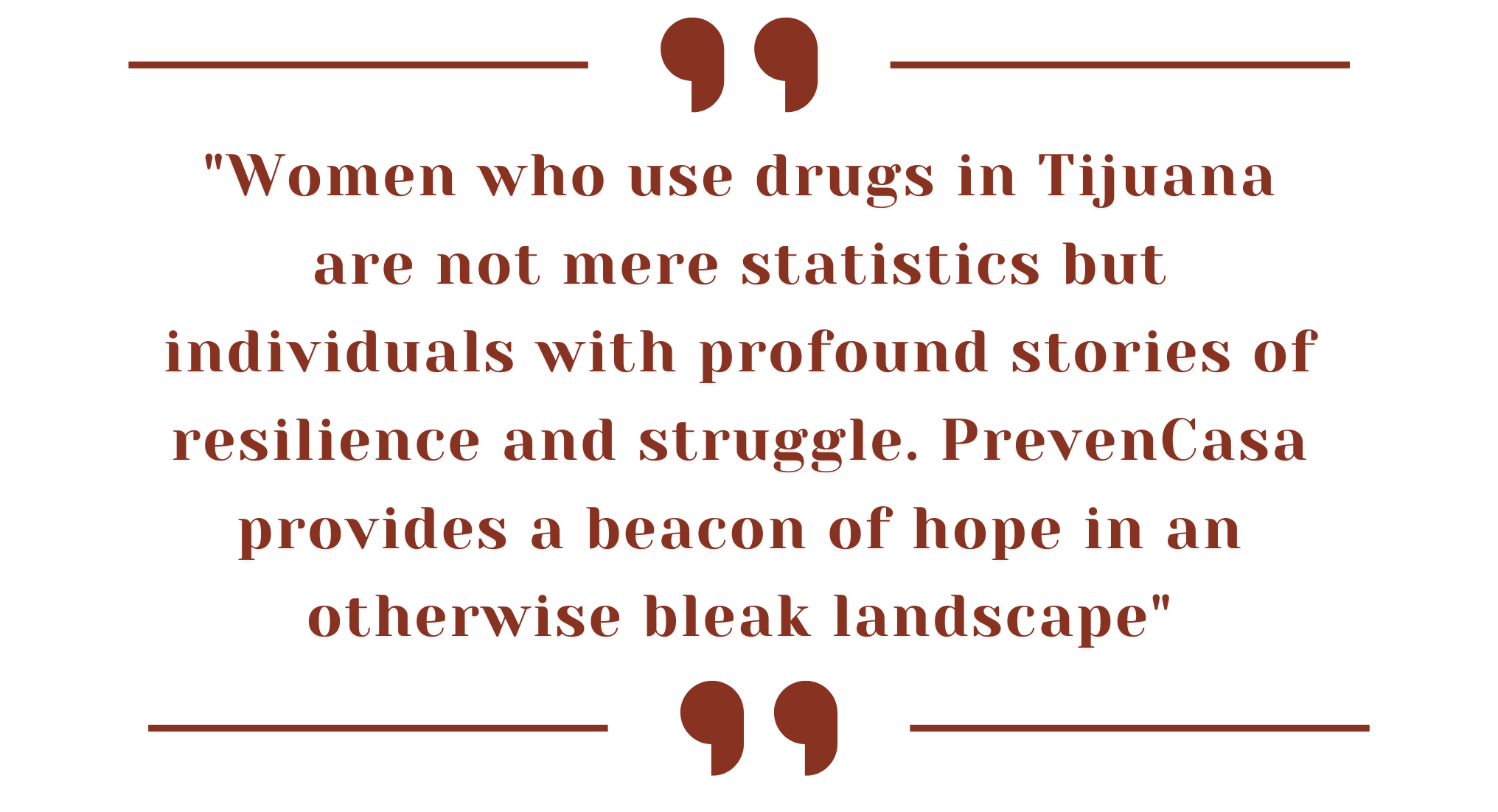By Carolina Arredondo Sanchez Lira, Master of Arts in Global Studies, University of Oregon
The War on Drugs in Mexico, which began in 2006 and followed U.S. models of militarization, has largely failed to achieve its intended goals. Instead, it has intensified violence, corruption, and instability, particularly in border areas like Tijuana. Women who use drugs have been disproportionately affected by this crisis, enduring increased stigma, gender-based violence, and severely limited access to essential services. This situation has deteriorated further under President Andrés Manuel López Obrador (AMLO), whose administration, despite promises to de-escalate the conflict, has increased militarization and reduced funding for harm reduction initiatives, exacerbating the marginalization of already vulnerable communities.
My research focuses on a particularly overlooked demographic: women who use drugs. Historically, research on substance use has predominantly centered on men, leaving significant gaps in understanding the specific challenges faced by women. This ethnographic study examines PrevenCasa—a non-profit clinic located in Tijuana’s Zona Norte—and evaluates its impact on women who use drugs amidst the ongoing conflict exacerbated by AMLO’s policies.
The study involved four focus groups with clients and interviews with five staff members from PrevenCasa, providing insight into the lived experiences of women who use drugs, the significance of PrevenCasa’s services, and the broader network of support organizations. The study engaged 19 participants in total, comprising 14 women in focus groups and five staff members.
Lived Experience & Challenges
The predominant theme emerging from the study is the pervasive nature of violence. Participants reported experiencing structural, community, and gender-based violence, with structural violence being particularly prevalent. Many women described violence inflicted by the criminal justice system, including physical and sexual assaults by police officers. One participant, Cristina, recounted a harrowing encounter with a police officer who threatened her with severe harm if she reported the assault:
“A mí me dijo [el policía]. ‘Si vas y me reportas, yo sé quién eres tú, te voy a mirar bien la cara y donde te vea, te voy a agarrar y te voy a aventar a las aguas negras, y vas a amanecer toda hinchada.” Cristina, Focus Group 4
“He [the policeman] told me. ‘If you go and make a report, I know who you are, I’m going to take a good look at your face and wherever I see you, I’m going to grab you and throw you into the sewage waters, and you’ll wake up all swollen.”
Participants also highlighted how the Mexican government’s policies contribute to structural violence. For instance, the restricted availability of life-saving medications like Narcan, which is controlled and expensive, increases the risk of fatal overdoses. Karen, a staff member, noted:
“Yo siempre he dicho que el COVID no significó mucho. En realidad, para la comunidad, o sea, significó más la muerte del compañero de consumo por sobredosis… hubo realmente una epidemia fuerte, fue la llegada del fentanilo, COVID en realidad no significó mucho.” Karen, Staff Member
“I have always said it, COVID didn’t mean much. For the community, the death of a fellow drug user due to an overdose meant much more… there was a really strong epidemic, it was the arrival of fentanyl, COVID didn’t really meant much.”
This observation underscores the severe impact of the fentanyl crisis compared to the COVID-19 pandemic, with the lack of access to Narcan leading to a heightened mortality rate among drug users.
Importance of PrevenCasa
Despite the dire circumstances, participants highlighted the vital role PrevenCasa plays in their lives. The clinic offers a sense of safety, advocacy, and community support, fostering a sense of belonging among women who use drugs. Carmen, a focus group participant, expressed:
“Pues PrevenCasa me representa… como que lo hace sentir a uno como si se sintiera querido a pesar de ser…bueno, de usar drogas. Sentimos mucho apoyo y mucha aceptación y eso nos hace sentir un poco mejor y no estar tan negativa a pesar de todo… nos da una como que algo muy real” Carmen, Focus Group 3
“Well, PrevenCasa represents to me… like it makes you feel like you are loved despite being… well, a drug user. We feel a lot of support and a lot of acceptance and that makes us feel a little better and not to be so negative despite everything… it gives us something very real.”
PrevenCasa’s services, such as providing showers, help reduce encounters with the police and prevent theft of personal belongings. During my time at PrevenCasa, I witnessed their staff’s unwavering dedication and resilience. Their focus on patient autonomy and harm reduction strategies is crucial and should be prioritized.
The stories collected during this research offer a stark reminder of the human cost of the War on Drugs. Women who use drugs in Tijuana are not mere statistics but individuals with profound stories of resilience and struggle. PrevenCasa provides a beacon of hope in an otherwise bleak situation, but the need for broader systemic change is clear. The insights from this study call for a fundamental shift in drug policy—one that emphasizes harm reduction, human dignity, and rights over militarization and punishment.
Expanding and supporting community-based care models like PrevenCasa is essential to addressing the root causes of suffering and providing the support and opportunities these women deserve. PrevenCasa’s work exemplifies the positive impact of compassionate, community-centered care and serves as a model for future initiatives.

